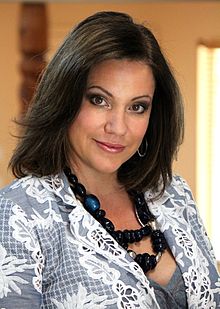Alisa Valdes
American writer
Alisa Valdes-Rodriguez (born February 28, 1969 in Albuquerque, New Mexico) is an American author, journalist, and film producer.

Quotes
edit- The biggest driving force in my life has been justice — and by that I don’t mean revenge. I mean fairness for all kinds of people. I think it comes in part from being the daughter of an immigrant who was grossly underestimated for most of his career and life, and the sort of despair you feel watching that happen, the sense that things aren’t fair from a very early age…
- On the theme that permeates her work in “From Dirty Girls to Enlightened Ladies” in AARP (Winter 2010)
- Never sat down and thought: “I’m going to create a new genre.” I just sat down and wrote a book that I wanted to read but couldn’t find. In retrospect, I don’t think it’s a new genre; it’s just a novel. There’s an unfortunate tendency in the publishing industry to view ethnicity as a genre and only for certain people. So if you are a minority, your race or ethnicity becomes your genre. Or if you are a woman, your sex becomes your genre. “Women’s fiction”: What does that even mean? Would we ever dare say “commercial men’s fiction”? I think these are marketing terms.
- On what she aimed for when writing her 2003 novel The Dirty Girls Social Club work in “From Dirty Girls to Enlightened Ladies” in AARP (Winter 2010)
- There are writers in commercial women’s fiction who get really worked up, and they blog about [the label] and rail against the establishment. I can empathize and understand that frustration, but at the same time, it’s a waste of energy. I look at what the readers and writers of the romance genre have done in creating a parallel universe where they sell millions of books to readers who know these writers are good. They don’t need the stamp of approval. And what I love about my readers is that they are far more sophisticated, in my opinion, than most literary critics, and far less insecure. At the end of the day, people are reading my books and communicating directly with me, thanks to technology.
- On how she views the term “chick lit” in “From Dirty Girls to Enlightened Ladies” in AARP (Winter 2010)
- As a bisexual woman (who, as it happens, is faithfully married to a man and therefore living a “straight” life) I feel it is important to include homosexual or bisexual characters in my work. I am living proof that such things are not “choices,” but innate…
- On how she tries to include LGBT characters in her works in “Interview With Alisa Valdes-Rodriguez” in AfterEllen.com (2008 Sep 25)
- I think labels are generally used to benefit those who invented them, and those who invent them tend not to be those upon whom they are foisted. That said, labels can be tools of empowerment or marginalization, depending on who is using them and why…
- On how she views “labels” in society in “Interview With Alisa Valdes-Rodriguez” in AfterEllen.com (2008 Sep 25)